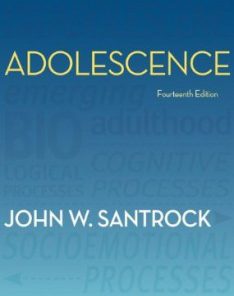Test Bank for Adolescence Canadian edition Ian McMahan, Susan Thompson
$35.00 Original price was: $35.00.$26.50Current price is: $26.50.
Test Bank for Adolescence Canadian edition Ian McMahan, Susan Thompson
Test Bank for Adolescence Canadian edition Ian McMahan, Susan Thompson digital download immediately after payment is complete.

Product details:
- ISBN-10 : 0205843719
- ISBN-13 : 978-0205843718
- Author: Ian McMahan
Adolescence, Canadian Edition, by Ian McMahan and Susan Thompson, combines rigorous, scientific coverage of adolescent development research with a scholarly yet enjoyable narrative style that is rarely found in textbooks. The table of contents follows an ecological systems framework to show how individual teens both affect and are affected by their families, peers, schools, and society. Adolescence also employs unique pedagogy to ensure students practise active learning and deep processing, focus on the practical applications of what they are studying, think critically and become educated consumers of the research.
Table contents:
Chapter 1 Adolescence Understanding the Past and the Present, and Planning for the Future
1.1 Themes and Approaches
Structure of This Text
1.2 Learning Strategies
Who Is an Adolescent?
1.3 Two Sorts of Transitions
1.4 Phases and Tasks
1.5 Adolescence across History
Ancient Times
Preindustrial Europe
Rousseau and the Enlightenment
19th- and Early 20th-Century Canada
20th-Century Teens
Teens Today
Adolescents in a Global Age
1.6 Old, Young, and In Between
The Population Pyramid
1.7 Where Is Adolescence Going?
Globalization
Consumerism and Teen Culture
Schooling for All?
Urbanization
Virtuous and Vicious Cycles of Economic Growth
Health-Related Challenges
1.8 Survival and Growth
1.9 Theories about Adolescence
Biological and Evolutionary Theories
Psychoanalytic Theories
Cognitive Theories
Learning and Social Cognitive Theories
Social and Anthropological Theories
Ecological and Developmental Systems Theories
Summary
Chapter 2 Puberty and Physical Development
The Biology of Puberty
2.1 Hormones in Action
2.2 Physical Development
Sexual Development
Menarche and the Secular Trend
2.3 Responses to Puberty
Personal Responses to Puberty
Effects of Pubertal Timing
Parental Responses to Puberty
Cultural Responses to Puberty
2.4 Brain Development
The Structure of the Brain
The Developing Brain
Behaviour and the Brain
2.5 Health Issues
Puberty and Mood
Body Image
2.6 Sleep Needs
Nutrition and Exercise
Summary
Chapter 3 Cognitive Changes
3.1 Piaget’s Approach
Stages of Cognitive Development
The Logic of Formal Operations
Piaget’s View of Logic in Everyday Life
Adolescent Egocentrism
The Imaginary Audience
The Personal Fable
Other Views on Egocentrism
Beyond Piaget
3.2 Society, Culture, and Cognition
The Role of Mental Resources
3.3 Information Processing
Attention
Working Memory
Fuzzy Traces and Rules of Thumb
3.4 Intelligence in Adolescence
Measuring Intelligence
Does Intelligence Change with Age?
Social Class, Ethnicity, and IQ
Other Views of Intelligence
3.5 Thinking about Thinking
Metacognitive Strategies
Ideas about Knowledge
3.6 Thinking Critically
Summary
Chapter 4 Families
4.1 Adolescents in the Family System
Families as Dynamic Systems
4.2 Changing Functions and Expectations
Extended Families
4.3 Parents and Parenting
Parenting Dimensions and Styles
Who Affects Whom?
Ethnic and Cultural Differences
Authoritative Parenting for Everyone?
And Where Do Helicopters Fit In?
4.4 Autonomy and Control
Two Sorts of Autonomy
Behavioural and Psychological Control
4.5 Attachment in Adolescents
Attachment Experiences and Working Models
Parent–Teen Conflict
Conflict across the Adolescent Years
Families and Behavioural Genetics
4.6 Siblings and Adolescence
The Sibling Relationship
Only Children
4.7 Family Diversity
Divorce and Adolescents
Remarriage and Stepfamilies
Dual-Earner Families
Same-Gendered-Parent Families
- Summary
People also search:
adolescence mcgraw hill
adolescence 13th edition
xcanadensis instagram
You may also like…
Test Bank
Test Bank for Developmental Psychology Childhood and Adolescence, 4th Canadian Edition: Shaffer












